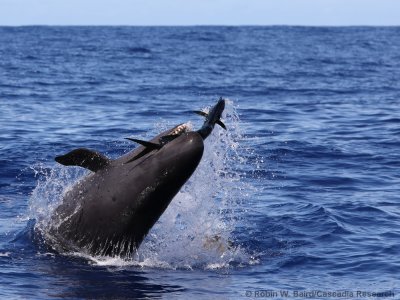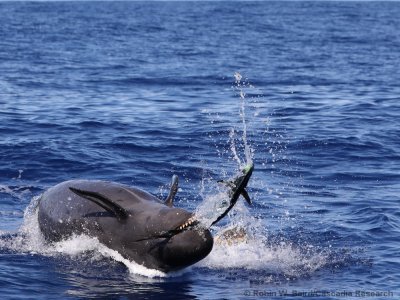Researchers have captured "spectacular" images of false killer whales devouring fish in mid-air in the waters around Hawaii.
The incredible photos were snapped by members of the Cascadia Research Collective on December 3—three days into a 16-day field project aimed at studying the foraging behavior of these animals.
The pictures show the false killer whales leaping out of the ocean off the island of Lāna'i during attempts to catch their prey—mahi-mahi fish. The aim of this behavior is typically to stun their prey, researchers said.
"The encounter with the spectacular predation event was on December 3, which was our third day on the water for a 16-day field project, and we've actually seen them three more times. But the predation events on December 3 were by far the most spectacular," Robin Baird, a research biologist with the Cascadia Research Collective, told Newsweek.
"It was certainly very exciting to see the predation events, with the false killer whales leaping into the air repeatedly as they are trying to stun the fish. It isn't actually all that rare—false killer whales regularly leap out of the water when they are attacking mahi mahi. Sometimes they are doing it to try to ram the fish, sometimes they are trying to hit the fish with their tail."
Baird said this population of false killer whales eats a lot of mahi-mahi, but they also feed on yellowfin tuna, wahoo fish, skipjack tuna, broadbill swordfish, opah and other species.
False killer whales are large members of the dolphin family that have similarly-shaped skulls to orcas, hence the name.
These rare dolphins are found in open waters throughout the tropics and sub-tropics, with a particularly large concentration around the Hawaiian islands, according to marine conservation non-profit Oceana.
One of the largest populations of these animals is found off Hawaii, numbering more than 1,500 animals, many of whom live in small, stable groups of 15 to 25.
False killer whales are highly intelligent creatures that hunt cooperatively and form strong social bonds that can last for many years.
The main population of false killer whales living off Hawaii is listed as endangered under the U.S. Endangered Species Act, having suffered a large decline between the 1980s and 2000s.
"The most likely cause of the decline actually relates to what they feed on—almost all the fish they eat are also targeted by fisheries, and false killer whales do try to take fish off lines, sometimes getting hooked as a result," Baird said.



Uncommon Knowledge
Newsweek is committed to challenging conventional wisdom and finding connections in the search for common ground.
Newsweek is committed to challenging conventional wisdom and finding connections in the search for common ground.
About the writer
Aristos is a Newsweek science reporter with the London, U.K., bureau. He reports on science and health topics, including; animal, ... Read more





